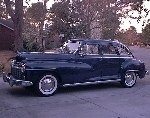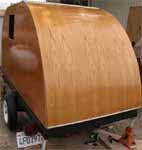Give me feedback on my battery set up
46 posts
• Page 2 of 4 • 1, 2, 3, 4
I agree, the batteries will equalize, but if one desides to crap out, it's going to take the other one with it. Like someone mentioned earlier, the marine battery selector is cheap insurance. That way, you can run one, both or none.
-

Brad Lustig - Teardrop Master
- Posts: 135
- Joined: Wed May 11, 2005 11:53 am
- Location: Mount Pleasant, SC USA
Auszooker wrote:Batteries wont kepp discharging into each other, they will equalise a bit and then stay matched to each other
the only time this wont happen is when
a one battery is faulty and wont hold its charge
b batteries arent the same model, the smaller one will discharge quicker and the larger one will equalise with it but that capacity will still be there to use just at a lower voltage
Diferences in potential will be equalized at all times. The act of equalizing the other battery will drain the first lower. Now i don't know the frequency with which this happens, but i'll wager it is within Hz (cycles per second) Touch a battery to ground and see how fast it tries to equalize! Speed o' light baby!!! Watch the heat melt stuff. There's a very good extreme example. But on a smaller scale it's happening all the time!!! No two batteries will ever contain the exact same potential because the won't be carrying the exact same amount of solutuion, even battery cell wall size varies, within specifications, within a single battery!
Last edited by webbedouin on Wed Jul 06, 2005 2:46 pm, edited 1 time in total.
-

webbedouin - Teardrop Builder
- Posts: 29
- Joined: Sat Jul 02, 2005 8:13 am
- Location: Lake Isabella, CA




